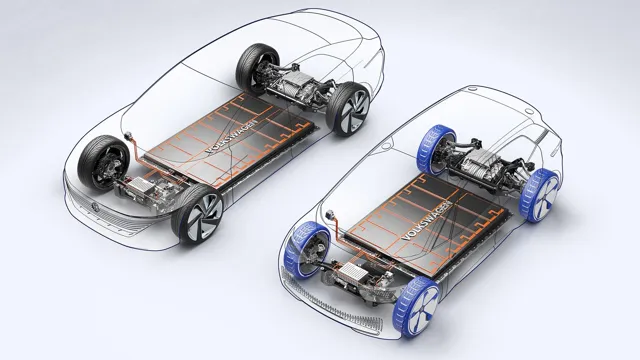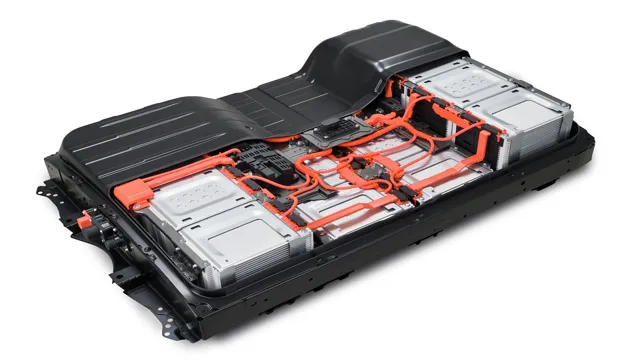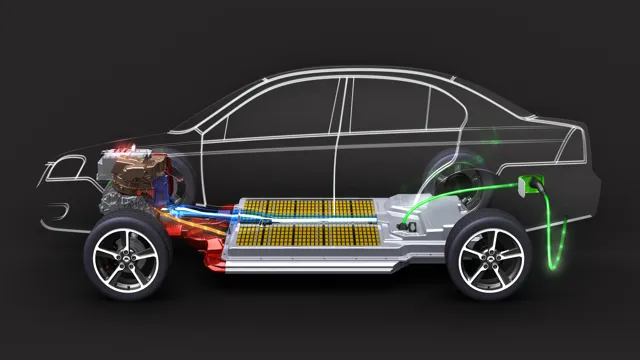Revving Up the Debate: Are Electric Car Batteries Good or Bad for the Environment?
Electric cars have become more popular in recent years, leading to many discussions about their benefits and drawbacks. One of the most crucial components of electric cars is their battery. These batteries power the vehicle and are responsible for its performance and range.
However, electric car batteries also have their pros and cons. In this blog post, we’ll explore the advantages and disadvantages of electric car batteries, providing you with a comprehensive understanding of this important topic. Whether you’re considering buying an electric car or just curious about this emerging technology, keep reading to learn more.
Benefits of Electric Car Batteries
Electric car batteries are a great innovation, offering numerous benefits to drivers and the environment alike. Not only are they more energy-efficient than traditional gasoline-powered cars, but they also produce zero emissions and contribute significantly to reducing air pollution. Additionally, electric car batteries are much quieter than traditional car engines, resulting in less overall noise pollution.
They also require less maintenance and have a longer lifespan, saving drivers money in the long run. While some may argue that it takes a long time to charge an electric car battery, newer models have significantly reduced charging times and offer more advanced features than ever before. All things considered, electric car batteries are a positive development in the automotive industry and a great way to reduce our carbon footprint while driving.
Less Pollution
When it comes to the benefits of electric cars, one of the most significant advantages is the reduction in pollution. Unlike traditional gasoline vehicles, electric cars run on battery power and emit zero emissions. The batteries used in electric cars are designed for longevity and can be recycled at the end of their lifespan, making them an environmentally friendly choice for transportation.
Plus, with the rise of renewable energy sources like solar and wind, electric cars can also be powered by clean, sustainable energy. By choosing an electric car, you’re taking a step towards a cleaner, healthier planet for all. So why not make the switch and see the benefits for yourself?
Cheaper Fuel Costs
When it comes to electric cars, one of the most significant benefits is cheaper fuel costs. Electric cars use electricity as their primary fuel source, which is usually cheaper than gasoline or diesel. This can result in considerable savings on fuel costs, particularly for individuals who cover long distances regularly.
Additionally, electric cars have batteries that can store excess energy generated by regenerative braking and use it to power the car. This function can save drivers money in the long run, as they don’t have to rely on petrol or diesel to keep their cars going. With more and more car manufacturers looking to expand their offerings in the electric car market, it’s likely that fuel costs will continue to drop in the coming years, making it an even more attractive option for cost-conscious motorists.
So, if you’re looking to cut down on your fuel expenses, investing in an electric car may be your best bet!
Lower Maintenance Costs
Lower maintenance costs are one of the main benefits of electric car batteries. Unlike traditional gasoline vehicles, electric cars don’t require oil changes or regular engine maintenance. Additionally, electric batteries have fewer moving parts, which means there are fewer parts that can break down or malfunction.
This leads to less trips to the mechanic and less money spent on repairs. While the initial cost of an electric car may be higher than that of a gasoline car, owners can save money in the long run by avoiding costly maintenance and repairs. Investing in an electric car not only benefits individual drivers but also the environment with its lower carbon footprint compared to gasoline cars.
Drawbacks of Electric Car Batteries
When it comes to electric car batteries, there are certainly some drawbacks that should be considered before making the switch. For one, the current range of most electric cars is limited, often requiring frequent charging or its use to be limited to local driving. Additionally, charging infrastructure is not yet as widespread as gas stations, although there has been much progress in recent years.
Another issue is that the production and disposal processes for electric car batteries can have negative environmental impacts. However, it’s important to consider the benefits as well, such as lower emissions and overall costs in the long run. So, are electric car batteries good or bad? It ultimately depends on personal priorities and circumstances, but with continued advancements in technology, it’s likely that the drawbacks will be addressed over time.
Limited Driving Range
One of the biggest drawbacks of electric car batteries is their limited driving range. While traditional gasoline-powered cars can go hundreds of miles on a full tank, electric cars typically max out at around 200-300 miles on a single charge. This can be a major inconvenience for drivers who depend on their vehicles for long-distance travel or have limited access to charging stations.
However, it’s important to note that advances in battery technology have increased the range of electric cars over the years, and many new models are hitting the market with ranges well over 300 miles. Additionally, hybrid cars offer the best of both worlds with a combination of gas and electric power, allowing for greater range and flexibility. As the infrastructure for charging stations continues to improve and more drivers make the switch to electric, the limitations on driving range will become less of an issue.
Long Charging Times
One of the biggest drawbacks of electric car batteries is their long charging times. Unlike traditional gasoline cars, which can be refueled in just a few minutes, electric cars typically take several hours to fully charge. This can be inconvenient for drivers who are used to the quick and easy refueling process of gasoline cars.
Plus, long charging times can limit the distance and flexibility of travel, especially for long road trips. However, advancements in technology have led to the development of faster charging stations and more efficient batteries, which could help reduce charging times and improve the overall convenience of electric cars.
High Upfront Costs
One of the major drawbacks of electric car batteries is the high upfront costs. While electric car batteries are great for the environment and can save you money in the long run, they can be expensive to purchase initially. This can be quite a turn off for many buyers, especially those who are used to buying cars that are less expensive upfront.
However, it’s important to remember that the cost of an electric car battery will often be offset by savings on gas and maintenance over the life of the vehicle. It’s also worth considering that battery technology is constantly improving, which means that the upfront cost of electric car batteries will likely decrease over time. Overall, while the high upfront costs of electric car batteries might be a deterrent for some, it should not overshadow the many benefits of driving an electric car.
Environmental Impact of Electric Car Batteries
As the popularity of electric cars grows, many people wonder whether electric car batteries are good or bad for the environment. While electric cars produce no emissions while driving, there are still concerns about the environmental impact of electric car batteries. The production of electric car batteries requires a significant amount of energy, and the extraction and processing of the raw materials used in these batteries can also have a negative impact on the environment.
Furthermore, the disposal of old batteries can cause environmental harm if they are not recycled properly. However, as technology improves, the environmental impact of electric car batteries is expected to decrease. Researchers are developing new battery materials that could be less harmful to the environment, and recycling programs are becoming more prevalent.
Overall, while electric car batteries may have a negative impact on the environment in some ways, the benefits of electric cars in reducing emissions and helping combat climate change still make them a better choice for the planet than traditional gas-powered cars.
Reduced Carbon Emissions
Electric car batteries have a significant impact on the environment when it comes to reducing carbon emissions. While electric cars themselves produce zero emissions while driving, the batteries that power them require mining and manufacturing processes that can have negative consequences for the environment. However, it’s important to consider the impact of electric car batteries across their entire lifespan.
When comparing the overall carbon emissions of electric cars to gasoline-powered cars, studies have shown that electric cars are still significantly more environmentally friendly. Additionally, advancements in battery technology are rapidly improving the sustainability and longevity of these batteries, making them an even more attractive option for eco-conscious consumers. So, while there may be some environmental trade-offs involved in the production of electric car batteries, the long-term benefits of reduced carbon emissions and a cleaner planet make them a smart choice for the future.
Battery Disposal Challenges
Electric car batteries pose a significant threat to the environment due to the challenges of their proper disposal. The batteries use a range of rare earth metals, lithium, and cobalt, which are highly toxic and can cause severe pollution if not effectively managed. These metals can leach into the soil and groundwater, leading to severe environmental damage.
The recycling of the batteries can be energy-intensive and expensive due to their complex composition, making it essential to find alternative disposal methods. The environmental impact of electric car batteries is a genuine concern that must be addressed before electric vehicles can become a viable alternative to fossil-fueled cars.
Final Verdict: Are Electric Car Batteries Good or Bad?
If you’re wondering whether electric car batteries are good or bad, the answer isn’t as straightforward as you might think. On one hand, electric car batteries offer numerous benefits over traditional gasoline-powered vehicles. They are energy-efficient, produce zero emissions, and provide a quiet and smooth driving experience.
But on the other hand, the production of electric car batteries requires a significant amount of energy and natural resources. Additionally, the disposal of old or worn-out batteries can also be an issue. However, advancements in technology are making electric car batteries more sustainable and efficient.
In conclusion, while electric car batteries have their downsides, the overall benefits outweigh them. So, the answer to the question of whether electric car batteries are good or bad is: they’re good!
Conclusion
After careful consideration, it’s safe to say that electric car batteries are both good and bad. On one hand, they provide a sustainable and environmentally-friendly alternative to traditional gas-powered vehicles. On the other hand, the production and disposal of these batteries still pose significant concerns for the environment.
It all comes down to striking a balance between innovation and responsibility. So let’s continue to push for advancements in electric car technology, while also ensuring that we are properly managing the impact of these batteries on our planet.”
FAQs
What are the advantages of electric car batteries?
Electric car batteries are environmentally friendly, cost-effective in the long run, and require less maintenance than traditional car batteries.
Are electric car batteries safe?
Yes, electric car batteries are safe. They undergo rigorous testing and have multiple safety mechanisms in place to prevent fires or explosions.
How long do electric car batteries last?
The lifespan of an electric car battery depends on various factors, such as the type of battery, driving habits, and climate. Generally, electric car batteries can last anywhere from 8 to 20 years.
Can electric car batteries be recycled?
Yes, electric car batteries can be recycled. The recycling process extracts valuable metals from the batteries, such as lithium, cobalt, and nickel, which can be reused in other products. Recycling also reduces the environmental impact of battery disposal.





